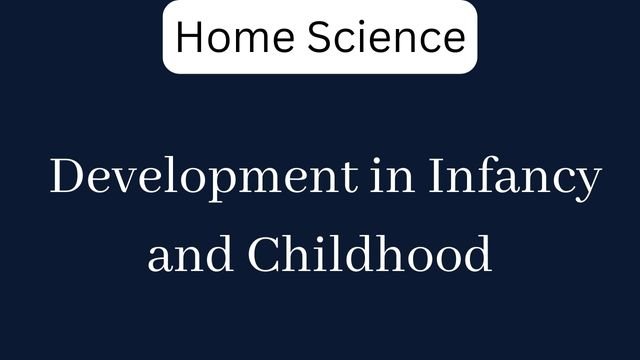Development in Infancy and Childhood
- Childhood is an extremely important step of all the steps involved in life span development. In this stage, growth and development in children takes place at a very rapid rate.
- By the end of childhood stage height of a child is 57.5 inches and weight is 48 kg. There are paradigm changes in the face of child and slowly the baby face disappears. This age is also known as ‘age of ugliness’. The child looks unattractive in this stage. By this age the child has full control over his muscles and nervous system. Purposive efforts are responsible for learning various skills. The child learns recognizable letters, colouring figures and clay sculpture. In addition to this, he learns some physical activities like running, jumping, crossing, leaping, etc. Sometimes because of parent’s over-protectiveness child is unable to learn some skills and gradually falls behind his peers.
- During childhood child has incredible strength, unlimited energy which he uses to learn various skills. But there are gender differences while learning certain skills for example girls learn skills involving finer muscles while boys learn large muscle involving skills. By the age of 6 years primacy of one hand gets established in a child. Though muscle development takes place in an order however many factors affect it.
Factors affecting physical development
1. Malnutrition
2. Physical weight and size
3. Diseases
4. Emotional condition (fear)
5. Lack of learning opportunities
6. Lack of encouragement
7. Modest qualities and feeble mind
Home Science Latest Post :- Click Here
Important Points of Development in Infancy and Childhood :-
- Childhood is an extremely important step of all the steps involved in life span development. In this stage, growth and development in children takes place at a very rapid rate.
- By the end of childhood stage height of a child is 57.5 inches and weight is 48 kg.
- Malnutrition, physical weight and size, modest qualities and feeble mind, emotional condition, lack of learning opportunities, lack of encouragement, etc. are the factors affecting child’s development.
- Cognition is the ability or process of acquiring knowledge and understanding through thought, experience, and the senses.
- A child learns to reason, contemplate, analyze, memorize by intellectual and mental development.
- Memorizing ability, reasoning ability, questioning ability, contemplating ability, generalizing ability-are some of the cognitive abilities of childhood.
- Wisdom or intellect is a strength which gives an individual the ability to adjust with the changing situations.
- Hardships of speech development are- voice defects and voice disorders such as defects in pronunciation, defects in sentence formation, (v) word meaning related defects, faulty pronunciation, unclear pronunciation, stammering, lisping and sharp obscure speech
- Bilingual in general means- ‘using two 2. languages’.
- Stages of language development- crying, blabbering, facial expressions, pronunciation, analyzing power, vocabulary, sentence formation.
- Ethical behavior is the conduct according to the ethical code of a social group.
Development in Infancy and Childhood Questions-Answers
1. Which of the following does not affect physical development?
(a) Malnutrition
(b) Nutrition
(c) Disease
(d) Fear
Click to show/hide
2. Which of the following is a cognitive ability of childhood?
(a) Maturity
(b) Senses
(c) Reasoning ability
(d) Wisdom
Click to show/hide
3. How many languages are used in bilingualism?
(a) Two
(b) One
(c) Three
(d) Five
Click to show/hide
4. Which is a voice disorder?
(a) Defect in pronunciation
(b) Deaf and dumb
(c) Stammering
(d) Defect in sentence formation
Click to show/hide
5. Which of the following is not a common emotion?
(a) Fear
(b) Smiling
(c) Anger
(d) Shyness
Answer :- ?????
